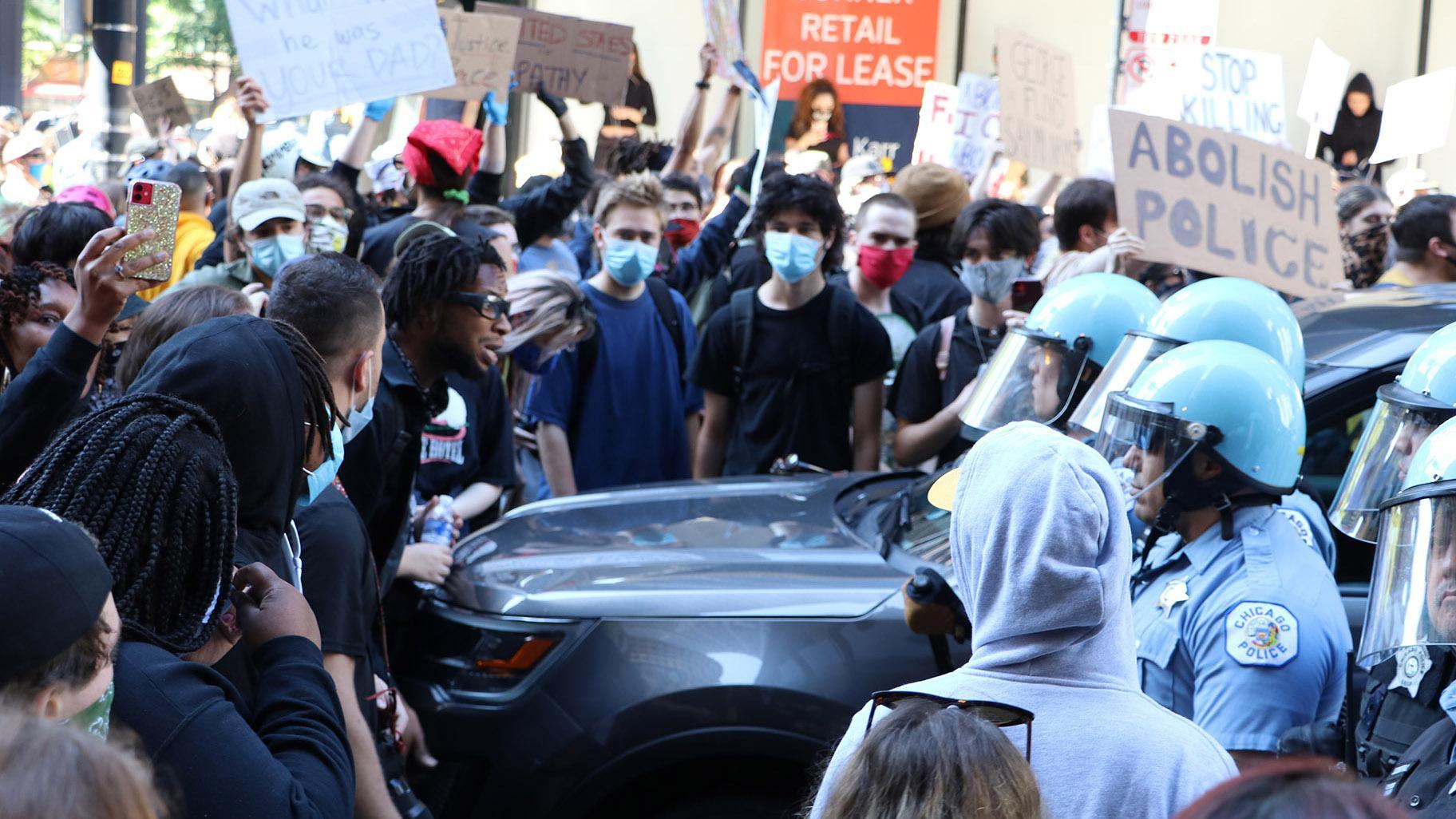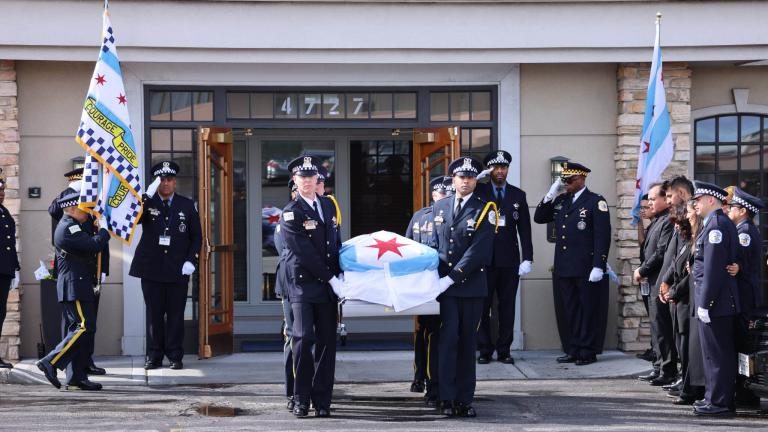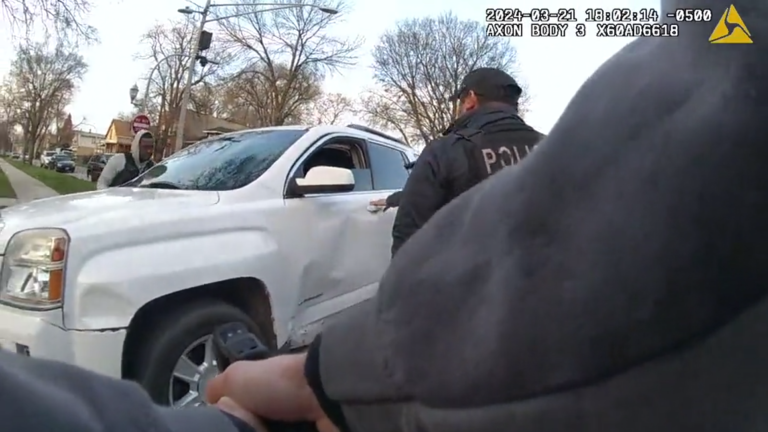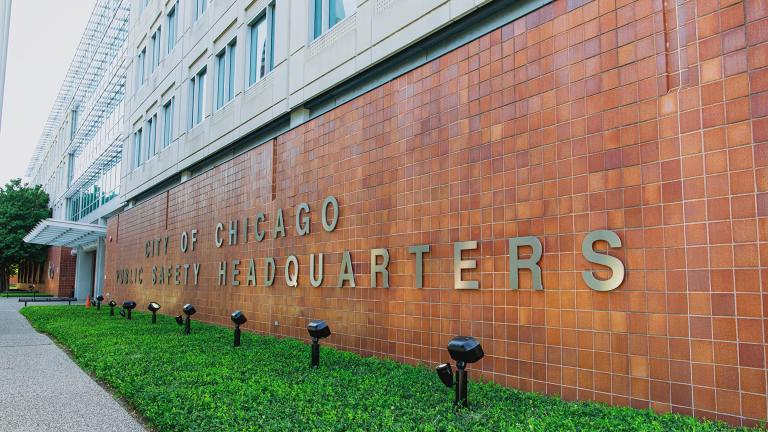 Protesters and police officers wearing riot gear have a standoff near Daley Plaza on Saturday, May 30, 2020. (Evan Garcia / WTTW News)
Protesters and police officers wearing riot gear have a standoff near Daley Plaza on Saturday, May 30, 2020. (Evan Garcia / WTTW News)
A new policy that would allow mass arrests of protestors during the Democratic National Convention violates the First Amendment and should be reversed, a coalition of reform groups told the federal judge overseeing efforts to reform the Chicago Police Department.
U.S. District Court Judge Rebecca Pallmeyer gave lawyers for the city and CPD until April 21 to respond to the concerns lodged by the coalition of police reform groups behind the consent decree, the federal court order requiring the Chicago Police Department to change the way it trains, supervises and disciplines officers.
Pallmeyer must now decide whether to intervene immediately and force changes to the policy even as CPD prepares for the Democratic National Convention, set to take place in Chicago from Aug. 19-24, and trains officers to respond to protests.
“The mass arrest policy eviscerates protections required by the First Amendment, the Consent Decree, and CPD’s existing First Amendment policy to protect people engaged in First Amendment expression and activity,” the consent decree coalition told Pallmeyer.
The urgency is especially acute because Chicago Police failed to protect the constitutional rights of thousands of Chicagoans during the protests and unrest triggered by the police murder of George Floyd in 2020, according to two probes, one by the independent monitoring team charged with determining whether the city is making good on its promises of reform and one by the city’s inspector general, according to the coalition.
“Given CPD’s widespread, brutal use of excessive force during the summer 2020 protests— and officers’ widespread failure to report uses of force during those protests — CPD should be strengthening its procedures for documenting, investigating, and publicly disclosing officer violence against protesters,” according to the coalition. “This policy does the opposite.”
The coalition’s concerns call into question assurances from Mayor Brandon Johnson and Chicago Police Supt. Larry Snelling that Chicago police officers are prepared to lawfully police the massive protests expected to erupt around the United Center and downtown under the white-hot media glare the convention is sure to trigger.
The potential of violent protests marring the 2024 convention is especially fraught because of the widespread condemnation of President Joe Biden’s support for Israel in its war against Hamas in Gaza.
Massive anti-Vietnam War protests outside the 1968 Democratic National Convention triggered a police riot, highlighting the party’s split over the war, and helping to elect former President Richard Nixon. Those images indelibly stained Chicago’s reputation as a home for political conventions.
When the Democratic National Convention returned to Chicago in 1996, it was peaceful, helping to boost former President Bill Clinton’s reelection bid.
“We want to make sure that we maintain peace. We’re going to police constitutionally, but we’re also not going to tolerate the violence,” Snelling said March 6 at a City Hall event that served to kick off the intense multi-agency planning process designed to ensure the convention is not disrupted by security threats.
CPD officers will be trained to respect the First Amendment and appropriately respond to violence during protests, Snelling said.
A spokesperson for the Chicago Police Department did not respond to a request for comment from WTTW News on Friday about the challenge filed by the consent decree coalition to CPD’s mass arrest policy.
Johnson said the Chicago Police Department would learn from the past.
“Constitutional policing is the goal,” Johnson said.
In his response to a question from WTTW News, Snelling drew a stark contrast between the events that followed Floyd’s murder — which were largely unanticipated by officials — and the protests expected around the convention.
Snelling also pushed back on the inspector’s general’s report, which found CPD botched nearly every aspect of its response to the protests and unrest.
“There was civil unrest across the entire city,” Snelling said. “It was violent, there were vehicles burned, officers were attacked, people were murdered in the middle of this. I don’t believe the report accounted for that.”
However, Snelling acknowledged that officers were unprepared to handle the protests, echoing a key finding of the probe conducted by the team charged with monitoring CPD’s compliance with the consent decree.
“Our officers had not been properly prepared for that,” said Snelling, who was a member of the department’s command staff during the summer of 2020. “I will be the first to say that. Our officers were out without the training to deal with that type of situation.”
The independent monitoring team led by attorney Maggie Hickey called on CPD to undertake “immediate, deliberate, and transparent efforts” to “protect First Amendment speech while reducing the use of force and violence toward people and property.”
To ensure those changes are made, the monitoring team added 17 requirements to the consent decree, ranging from new rules governing efforts to prepare for large protests and civil unrest to requirements that officers’ body-worn cameras be reviewed after incidents.
The monitoring team is scheduled to publicly weigh in on CPD’s efforts to comply with those new requirements in its next report, due by June.
As a result of the monitoring team’s probe of CPD’s handling of the George Floyd protest, CPD was required to revamp its policy for handling First Amendment protests to prevent what happened during the summer of 2020 from happening again.
That policy prohibits officers from arresting those engaged in First Amendment protests for “minor or petty offenses … or for actions that pose no immediate threat to the safety of the community, or others, or of causing property damage.”
The policy also requires officers to give protestors an opportunity to comply before they are subject to arrest or detention.
However, the department’s proposed mass arrest policy would reverse many of those protections and “does far too little to prevent a repeat of violent and systemic First and Fourth Amendment violations and Consent Decree violations during CPD’s response to protests around the 2024 DNC and beyond,” according to the consent decree coalition.
The policy, which has not been finalized, would not require officers to document every time they used force against a member of the public — only when someone is injured, in violation of the consent decree, according to the coalition.
If allowed to take effect, the policy would limit the ability of investigators to hold officers accountable for unjustifiably using force against Chicagoans, according to the coalition.
In addition, the coalition said, the policy does not properly limit the use of police dogs or ban “kettling,” the confinement by police of a group of demonstrators or protesters in a small area, as a method of crowd control.
Chicagoans were not given enough time to offer CPD leaders feedback on the policy after police brass engaged in a “sham public comment process,” according to the coalition. The monitoring team has repeatedly been critical of CPD’s efforts to allow members of the public to shape police policy.
2012 NATO Summit as a Model
Officers were better trained for the 2012 NATO summit, and CPD’s response was “completely constitutional,” Snelling said, vowing to model the department’s response on those plans.
During those protests, police officers passively monitored protests and kept most heavily armed units out of sight unless needed. That approach allowed officers to direct protests in a way that allowed officers to anticipate the crowd’s movements and set up blockades if necessary, according to an after-action report that lauded the approach.
But CPD’s response to those massive protests against the war in Afghanistan was not unblemished.
On May 20, 2012, police and protestors clashed two blocks west of McCormick Place, where leaders of the alliance were meeting. As protestors pushed toward the convention center, a melee erupted as officers struck protesters with batons to push them back.
Approximately 45 people were arrested, and four officers were injured.
But the police response to the 2012 NATO summit is perhaps best remembered for the charges leveled against three activists, who were accused of conspiring to attack the offices of then President Barack Obama, police stations, financial institutions and then Mayor Rahm Emanuel’s house.
All three men were arrested before any attacks took place, and all were acquitted of the most serious charges, which included conspiracy to commit terrorism and providing material support for terrorism, but convicted on charges they possessed incendiary devices.
Contact Heather Cherone: @HeatherCherone | (773) 569-1863 | [email protected]
A Safer City is supported, in part, by the Sue Ling Gin Foundation Initiative for Reducing Violence in Chicago.








